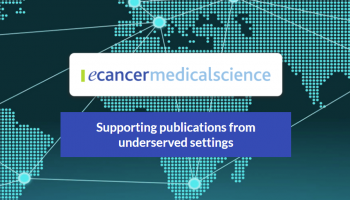
ecancer has today announced that, in order to meet the need for high-quality publications on cancer research, treatment and care in under-resourced settings, it will be making a significant change to the submission criteria for its open access journal, ecancermedicalscience.
The journal will change its submission criteria from 21st September 2020 to exclusively publish articles which feature at least one author from a low and middle-income country (LMIC), or which have a significant impact on under-resourced settings.
The World Health Organisation (WHO) has emphasised the urgent need to step up cancer services in LMICs. WHO warns that, if current trends continue, the world will see a 60% increase in cancer cases over the next two decades. The greatest increase (an estimated 81%) in new cases will occur in LMICs, where survival rates are currently lowest.
This pioneering approach will allow ecancer to contribute towards addressing the current imbalance in global scientific publishing and combat the significant lack of data on which to base national cancer control plans in LMICs. Proactively supporting authors from LMICs will encourage fruitful partnerships between researchers from High Income Countries and those based in LMICs to progress the pace of cancer research globally.
Prof Richard Sullivan, Director of the Institute of Cancer Policy, King’s College, London and Chair of the ecancer Trustees, said: “ We know that cancer cases in low and middle income countries are coming like a tsunami. We have to ramp up scholarly output to help support the healthcare communities who are on the front line of this crisis. Context specific, locally authored research, available for all to read on the global platform offered by ecancer will help. Moves like this are part of the solution. The scholarly publishing system simply isn’t fair as it stands. We know there are inherent western biases and we need to do something about it. We’ll be working with our strong partners in India, Africa and Latin America to make sure this change benefits the oncology community.”
Eduardo Cazap, Editor-in-Chief said “We know we need to redouble our cancer control efforts when we see the predicted numbers for low and middle income countries. Every patient deserves the best possible care and we have a duty to foster international communication, collaboration and offer the support that will empower the healthcare communities in the worst affected areas.”
ecancermedicalscience was launched in 2007 by eminent oncologists Prof Umberto Veronesi and Prof Gordon McVie. The journal’s mission then and now is to break down the barriers to publishing and accessing cancer research to narrow the gap between those who have access to adequate cancer prevention, treatment and care and those who do not.
The journal operates a model based on equality of opportunity where authors are asked to donate only what they can afford towards open access article publication costs. If authors do not have funds to pay, the fee is waived and over the past 13 years the ecancer charity has supported over 4500 authors to publish their research for free.
ecancer is a UK charity which provides accessible, high-quality educational content, free to the global oncology community. Our mission is to raise the standards of care for cancer patients across the world through education.
The journal is fully peer-reviewed and offers in-depth editorial support for all authors who need it, including free English language editing. Important COVID-19 research will still be considered for publication.